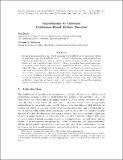Impediments to Universal Preference-based Default Theories
Author(s)
Doyle, Jon; Wellman, Michael
DownloadMIT-LCS-TM-416.pdf (2.972Mb)
Metadata
Show full item recordAbstract
Research on nonmonotonic and default reasoning has identified several important criteria for preferring alternative default inferences. The theories of reasoning based on each of these criteria may uniformly be viewed as theories of rational inference, in which the reasoner selects maximally preferred states of belief. Though researchers have noted some cases of apparent conflict between the preferences supported by different theories, it has been hoped that these special theories of reasoning may be combined into a universal logic of nonmonotonic reasoning. We show that the different categories of preferences conflict more than has been realized, and adapt formal results from social choice theory to prove that every universal theory of default reasoning will violate at least one reasonable principle of rational reasoning. Our results can be interpreted as demonstrating that, within the preferential framework, we cannot expect much improvement on the rigid lexicographic priority mechanisms that have been proposed for conflict resolution.
Date issued
1989-10Series/Report no.
MIT-LCS-TM-416